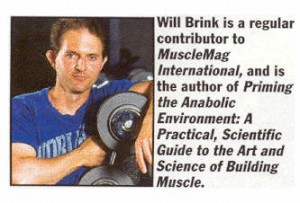 SNI: What is the most silly myth you hear regarding dietary supplements?:
SNI: What is the most silly myth you hear regarding dietary supplements?:
Brink: That because they are not FDA regulated they can’t possibly be effective and are inherently less safe then FDA approved drugs. FDA approved drugs kill more people per day then all nutritional supplements combined per decade at least. Dies that mean drugs are of no value? Of course not, but it does mean one has to take an objective risk to benefit look at them. I’m a huge proponent of scientific validation for nutritional supplements – vs. the hype and marketing that often passes for research – but seeing FDA approved anything inherently safer than nutritional supplements is a myth perpetuated by the media, who gets their ad budgets from…well…we won’t go there.
SNI: What is the most common mistake folks make with their exercise program when it comes to losing body fat (as their main goal).?
Brink: Depending on aerobics to “burn” fat and resistance/weight training to build strength and muscle. Following that, thinking steady state low intensity exercise (LISS) keeps one essentially irrelevant “fart burning zone” and avoiding higher intensity work, such as interval training, (including but not limited to HIIT ), resistance training, etc. It’s odd most “in the know” in the fitness/bodybuilding community, as well as the physiology community, have known all this for a long time, yet some how, it just does not seem to penetrate the “main stream” very well.
SNI: Describe the PERFECT meal (for improving body composition)..
Brink: That’s a tricky one as I feel macro nutrient ratios require some variables to be plugged in depending on the individual, which is one of many reasons I hate one-size-fits-all diet plans, but as a general statement, would be high/moderate in lean proteins, moderate in fat (of the right types and ratios) and low/moderate in high fiber nutrient dense carb sources with a heavy emphasis on vegetables cooked or raw. Lean piece of meat (chicken, fish, steak), big salad with perhaps olive oil/flax oil and vinegar dressing, and what left over on the plate for room, some brown rice and lentils. That’s long term healthy eating that, and as long as total cals are controlled, will alter bodycomp in the direction people want. If it’s not long term and generally healthy, I’m not interested.
SNI: List your top 10 fav supplements.
Brink: I tend to categorize supplements as wroth using, might be worth using, not worth using, which depends on the strength and quality of the studies that may – or may not! – exist for that supplement. Also depends on goals, etc. My personal supplement regimen includes:
Whey isolate
Creatine (monohydrate!!!!!)
Multi vite
Extra vite D
Fish oils
CoQ 10
Acetyl L Carnitine
Beta Alinine
L-Tyrosine
Pro biotics
I think that’s ten, but I do take more supps then that!
SNI: How much protein per meal do you recommend? How much protein daily?
Brink: Boring as it is, I’m still generally happy with the one gram per lb of bodyweight for active populations. Modern studies suggest that’s well above what needed to say support protein synthesis, anabolism, and so forth, but protein has many other effects in the human body. Besides, you have to eat something, and you have three choices: protein, carbohydrates, and fat, and I’m not a fan of high fat and or high carb diets, so having protein make up 20-30% of calories is perfectly acceptable in my view as a source of calories, etc. People think way too much about exactly how many grams of protein are needed for X specific effects in my opinion.
Will Brink has been a writer for over almost two decades and has been published in a wide variety of publications, including: Muscle Media, MuscleMag International, Lets Live, Muscle n Fitness, Life Extension magazine, Muscular Development, Townsend Letter for Doctors, IronMan, Inside Karate, Tactical Response, Exercise for Men Only, Physical, Power, Body International, Oxygen, Penthouse, Fitness RX, Big, as well as others over the years and in many different languages. He had a monthly column in MuscleMag International called “The Intake Update” for a decade. Many of his articles can be found on the major fitness/health/bodybuilding web sites, such as bodybuilding.com and hundreds of other sites.



